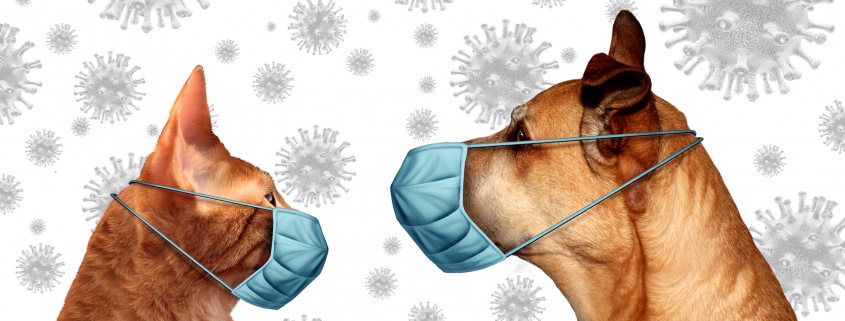BY MEGAN TREMELLING, DVM, LVS
Short answer: It’s unlikely.
Long answer: This is going to take a while.
By now, everybody has heard the basics of this story repeatedly: A previously undocumented virus was discovered at the end of 2019, and unfortunately the way it was discovered was that it was killing people. Since then it has spread around the world, sickening millions of people and killing hundreds of thousands. Throngs of scientists have been studying it to try to learn how it travels, who gets it, how it causes harm and how we can stop it. New information becomes available every day, and sometimes it conflicts with previous information. It’s bewildering and frightening. In the midst of it comes the information that COVID-19 may, possibly, be able to infect household pets.
Should we be worried about our dogs and cats?
Can they get sick? Should they be tested?
Possibly the most important thing to understand about SARS-CoV-2, the virus that causes COVID-19, is that nobody has the full story on it yet and won’t for a while. Medical research is a complicated subject. A positive test is not the same thing as an active infection. An infection is not the same as illness. Being ill is not the same thing as being contagious. All these factors, and more, make it challenging to know how worried we should be. Collecting and interpreting data, unfortunately, takes time and expertise. And while it seems like every journalist and politician pretends to be an epidemiologist or infectious disease specialist, really, most of the people you are hearing from are not experts. This includes me.
This is what we know so far:
Some dogs and cats have tested positive for the virus. In the case of pets, they are thought to have been exposed to the virus by their owners. However, many animals that have been exposed to ill owners have tested negative. It seems likely that the number of animals that have had the virus is very small compared to the number of humans who have had it. Although it is quite contagious among humans, we don’t seem to be efficient at infecting our pets.
Some animals, including ferrets and tigers, have shown signs of illness that may have been COVID-19. In experimental situations, cats have shown signs of COVID-19, but this has not been observed under natural conditions. So far, COVID-19 does not appear to cause serious illness in dogs; as a matter of fact, it may cause no disease at all. Not enough animals have tested positive for us to know. Thus if a dog or cat is feeling ill, it is extremely unlikely that it is due to COVID-19. They are much more likely to have one of the other viruses or bacteria that can affect them.
So, if you are sick, should you worry about your pet? The CDC suggests that if you are sick, it would be best to have someone else care for your pet while you keep a wide berth. If this is not possible, wear a facemask, hold off on snuggles and kisses and wash your hands before and after interacting with your pet. Testing pets for COVID-19 is not routinely recommended.
Whenever people are stressed, it is natural to worry. The possibility of illness occurring to a beloved pet is one of the things we worry about. However, so far it does not seem that the COVID-19 virus poses anywhere near the threat to our pets that it does to our human loved ones. As always, if your pet is feeling ill, you should contact your veterinarian and explain your concern. They can evaluate your pet and provide care regardless of the cause.
For the most up-to-date information about COVID-19 in humans or in pets, you can trust the experts at the Centers for Disease Control and Prevention: cdc.gov.



